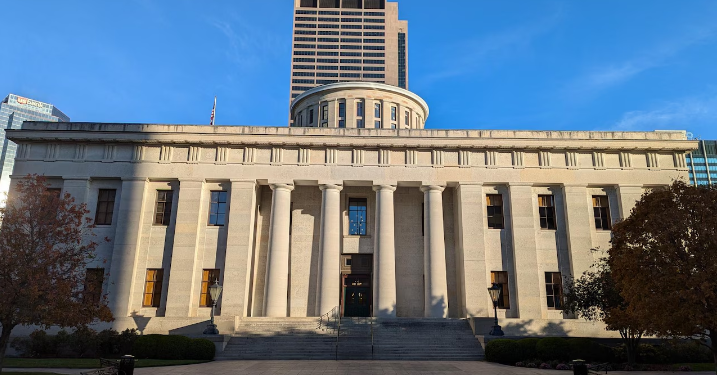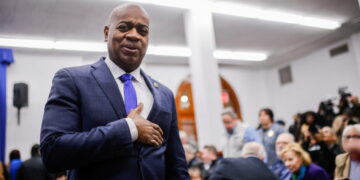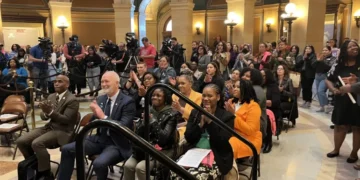Nov 4, 2024 Story by: Editor
COLUMBUS – The Ohio Legislative Black Caucus members voiced strong support for state Issue 1 on Tuesday, presenting it as a vital tool to amplify the voices of all Ohioans in government while refuting claims that it would diminish Black representation in the state legislature.
“We are here to set the record straight and debunk some of the misinformation and the myths about Issue 1 disenfranchising Black voters,” stated Rep. Terrence Upchurch, caucus president and Cleveland Democrat.
“That is absolutely a false claim and it’s inaccurate,” Upchurch emphasized. “It’s ironic that suddenly there’s heightened concern about Black disenfranchisement when we’re dealing with a supermajority that has already implemented voter suppression laws, complicated the voting process, and introduced stricter voter ID requirements. That’s what actually disenfranchised Black voters.”
Upchurch was joined by Columbus Democratic Rep. Dontavius Jarrells, Democratic Sens. Catherine Ingram of Cincinnati, and Hearcel Craig of Columbus, along with Deidra Reese from the Ohio Organizing Collaborative, a supporter of Issue 1. Together, they condemned the narrative from opponents suggesting that Issue 1 would negatively impact communities of color.
They pointed out that, after over two decades of Republican leadership, Black representation in Columbus has declined, and the voices of communities most in need of government support have gone increasingly unheard.
Issue 1 proposes to overhaul Ohio’s redistricting process by establishing a citizen-led commission responsible for drawing both state and congressional districts, removing elected officials from the process.
“The beauty of Issue 1 is it gives citizens control of the process,” noted Reese.
Sen. Ingram stressed that Issue 1 would foster fairness and transparency.
“We’ve known for a long time – and I’ll say, Democrats once did the same during redistricting – but the Republicans have maintained an unfair grip,” Ingram remarked. “It’s telling when the Supreme Court has had to say ‘Go back, it’s unconstitutional’ seven times.”
Issue 1 is a response to frustrations with Ohio’s gerrymandering practices, which critics argue distort voter influence by creating districts that solidify Republican dominance.
Despite presidential candidates receiving no more than 53% of Ohio’s vote over the last six elections, Republicans hold supermajorities in both the Ohio House and Senate and two-thirds of Ohio’s U.S. House seats.
The measure has gained support from the Ohio Conference NAACP, the Ohio Unity Coalition, the Ohio Legislative Black Caucus, and other civil rights organizations.
Opponents of Issue 1, in recent events around Cleveland and Columbus, warned that the measure might dilute minority representation by weakening the influence of economically disadvantaged minority voters, citing Michigan’s experience with its redistricting commission established in 2018. Former state Rep. John Barnes, a Cleveland Democrat, argued, “That’s not going to build businesses, that’s not going to build wealth, that won’t sustain communities. That won’t build opportunity.”
On Tuesday, Sen. Michelle Reynolds, a Black Republican from suburban Columbus, echoed Barnes’ concerns, stating, “Today’s all-Democrat response was pure panic from the Issue 1 campaign. This will gerrymander fixed wins for the radical left at the expense of Ohio’s minority neighborhoods. Detroit was divided more than 20 times, leaving it without a Black member of Congress for the first time in 70 years.”
However, the Democrats argued that the current system is already failing Ohio’s minority population, pointing to unaddressed issues like poverty, education, infant mortality, and gun violence under the current majority that does not prioritize the concerns of Democratic voters.
“We cannot allow this injustice to continue any longer,” Craig declared. “It is imperative that we reform the current mapmaking process to ensure fairness and transparency for the benefit of all Ohioans. We need legislators to focus on what matters most, and that’s the people.” Source: Cleveland

















